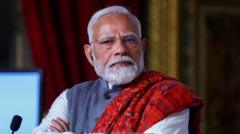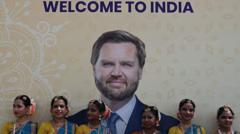Indian Prime Minister Narendra Modi's upcoming visit to Washington will center around enhancing the US-India strategic partnership, where he and President Donald Trump will discuss trade policies, tariffs, and energy initiatives amidst broader geopolitical concerns.
Trump and Modi Gear Up for Strategic Talks in Washington

Trump and Modi Gear Up for Strategic Talks in Washington
Bilateral negotiations between leaders will cover trade, tariffs, and energy collaboration.
As Indian Prime Minister Narendra Modi prepares for a visit to Washington this week to meet with President Donald Trump, both leaders are expected to engage in warm exchanges marked by laughter and a longstanding rapport. Their bond, cultivated since their initial meeting in 2017, has been amplified by high-profile joint appearances, including recent rallies in Houston and Ahmedabad. They share mutual strategic interests, particularly in countering China, which has cemented the stronger US-India partnership worldwide.
However, beyond the amicable atmosphere, the discussions will reveal the intricate transactional nature of the relationship, as both leaders come with specific expectations. Modi is set to meet several members of Trump's cabinet and prominent figures from the American business community, as well as tech entrepreneurs like Elon Musk. India is keen to develop its electric vehicles sector and could greatly benefit from potential Tesla investments.
While the conviviality persists, a range of demands is anticipated, especially from Trump, who might insist on further tariff reductions from India to address the significant US trade deficit, which has neared $46 billion. In response, Modi may propose bilateral negotiations aimed at establishing an economic partnership accord to lower tariffs on both sides, a strategy welcomed amid a growing American interest in trade agreements after years of more restrictive stances under previous administrations.
Furthermore, Trump could demand the repatriation of more undocumented Indians, a sensitive topic considering an estimated 700,000 Indians reside in the US under such circumstances. Modi's government has recently worked towards resolving these issues, with early flights returning individuals back home.
The energy sector will also be central to discussions, with Trump likely advocating for increased American oil purchases from India. The ongoing conflict caused by the Russian invasion of Ukraine has shifted global oil dynamics, presenting both challenges and opportunities for alignment. Modi might also advocate for greater American investment in India’s nuclear energy sector, aligning with the country’s aim to diversify its energy mix by 2030.
Technology cooperation is poised to be another key focus, especially in light of the implementation of the Initiative on Critical and Emerging Technologies (iCET), which both nations see as pivotal for their partnership. Ensuring the continuation of the H-1B visa program for skilled workers, crucial to many Indian IT professionals, may also be on the agenda, despite internal US pressures against it.
Relations with other countries could emerge in discussions as well, particularly with Iran, where India has made strides in developing connections through projects like the Chabahar port. Modi might seek clarity on US sanctions policies affecting this initiative and broader Iranian interactions.
In terms of global geopolitics, both leaders are expected to discuss the ongoing conflicts in Ukraine and Gaza, where India holds a vested interest in a peaceful resolution. Modi's position of non-criticism towards Russia could align with Trump's own stance, potentially positioning India as a mediator if circumstances allow.
Despite the range of complex topics on the table, a mutual goal of maintaining a constructive dialogue is clear. The importance of the Quad—a strategic partnership between the US, India, Japan, and Australia—will also reinforce their commitment to regional stability, particularly in light of rising tensions with China. As Modi prepares for his visit, both leaders seem determined to navigate the intricacies of their relationship while advancing a robust partnership that transcends mere transactional dealings.






















